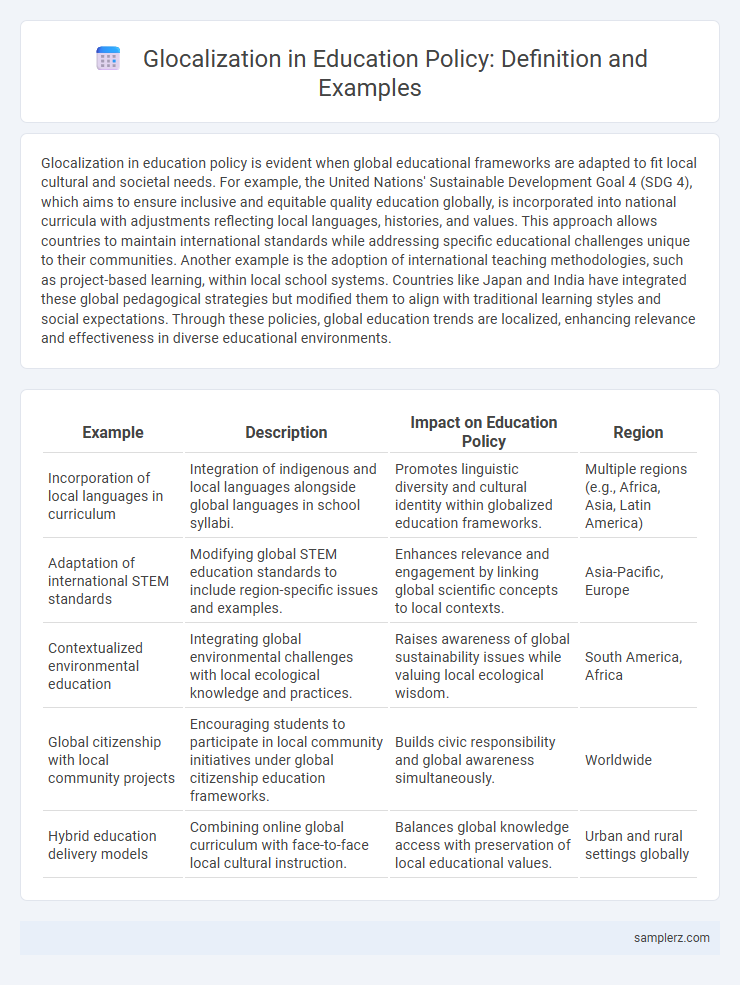Glocalization in education policy is evident when global educational frameworks are adapted to fit local cultural and societal needs. For example, the United Nations' Sustainable Development Goal 4 (SDG 4), which aims to ensure inclusive and equitable quality education globally, is incorporated into national curricula with adjustments reflecting local languages, histories, and values. This approach allows countries to maintain international standards while addressing specific educational challenges unique to their communities. Another example is the adoption of international teaching methodologies, such as project-based learning, within local school systems. Countries like Japan and India have integrated these global pedagogical strategies but modified them to align with traditional learning styles and social expectations. Through these policies, global education trends are localized, enhancing relevance and effectiveness in diverse educational environments.
Table of Comparison
| Example | Description | Impact on Education Policy | Region |
|---|---|---|---|
| Incorporation of local languages in curriculum | Integration of indigenous and local languages alongside global languages in school syllabi. | Promotes linguistic diversity and cultural identity within globalized education frameworks. | Multiple regions (e.g., Africa, Asia, Latin America) |
| Adaptation of international STEM standards | Modifying global STEM education standards to include region-specific issues and examples. | Enhances relevance and engagement by linking global scientific concepts to local contexts. | Asia-Pacific, Europe |
| Contextualized environmental education | Integrating global environmental challenges with local ecological knowledge and practices. | Raises awareness of global sustainability issues while valuing local ecological wisdom. | South America, Africa |
| Global citizenship with local community projects | Encouraging students to participate in local community initiatives under global citizenship education frameworks. | Builds civic responsibility and global awareness simultaneously. | Worldwide |
| Hybrid education delivery models | Combining online global curriculum with face-to-face local cultural instruction. | Balances global knowledge access with preservation of local educational values. | Urban and rural settings globally |
Integrating Local Cultures into Global Curricula
Integrating local cultures into global curricula exemplifies glocalization in education policy by adapting international standards to reflect indigenous knowledge, languages, and traditions. Schools incorporating regional history and customs alongside global competencies foster culturally relevant learning that enhances student engagement and identity. This approach supports multicultural understanding while preparing students for participation in a globalized world.
Adapting International Education Standards for Regional Needs
Adapting international education standards for regional needs exemplifies glocalization by integrating global benchmarks like the UNESCO Education 2030 framework with local cultural values, languages, and socioeconomic conditions. This approach allows policymakers to enhance curriculum relevance and inclusivity while maintaining competitive academic quality across diverse regions. Countries such as Finland and Singapore showcase effective implementation by customizing global standards that respect indigenous knowledge systems and address local workforce demands.
Community Participation in Policy-Making
Community participation in education policy-making exemplifies glocalization by integrating local cultural values with global educational standards. Involving parents, teachers, and local organizations ensures policies reflect community needs while aligning with international best practices. This approach enhances policy relevance, equity, and effectiveness in diverse educational contexts.
Bilingual Education as a Glocal Approach
Bilingual education exemplifies glocalization by integrating global linguistic competence with local cultural relevance, enabling students to acquire proficiency in both a global language like English and their native language. This approach aligns with education policies promoting multiculturalism and cognitive diversity while addressing local community needs and identity preservation. Countries such as Canada and Singapore implement bilingual programs that balance international communication skills with the preservation of indigenous languages, reflecting a strategic glocal education policy.
Localizing STEM Programs through Indigenous Knowledge
Localizing STEM education by integrating Indigenous knowledge revitalizes cultural heritage while enhancing scientific literacy in diverse communities. Education policies that incorporate Indigenous ecological understanding and traditional technologies create culturally relevant curricula, boosting student engagement and achievement. This glocalized approach bridges global scientific principles with local context, fostering innovation rooted in community identity.
Customizing Teacher Training for Cultural Relevance
Customizing teacher training for cultural relevance exemplifies glocalization in education policy by integrating global pedagogical standards with local cultural contexts. Tailoring professional development programs to reflect indigenous knowledge, languages, and community values enhances teacher effectiveness and student engagement. This approach supports inclusive education and fosters respect for diverse cultural identities within the classroom.
Hybrid Models of Digital Learning
Hybrid models of digital learning exemplify glocalization in education policy by integrating global technological advancements with local cultural and curricular needs. Schools adopt digital platforms and resources developed internationally while customizing content and teaching methods to reflect regional languages, values, and educational standards. This approach enhances access to quality education and fosters inclusive learning environments tailored to diverse student populations.
Glocal Partnerships between Schools and NGOs
Glocal partnerships between schools and NGOs exemplify glocalization in education policy by integrating local community needs with global educational standards. These collaborations enable schools to adopt culturally relevant curricula while leveraging global resources and expertise to enhance learning outcomes. NGO involvement often facilitates access to innovative teaching methods, technology, and inclusive education practices tailored to specific regional challenges.
Incorporating Traditional Practices in Modern Classrooms
Incorporating traditional practices in modern classrooms exemplifies glocalization in education policy by blending global pedagogical standards with local cultural heritage. Examples include integrating indigenous storytelling, native languages, and community rituals into the curriculum to enhance student engagement and cultural identity. This approach promotes culturally responsive education while meeting international learning benchmarks.
Balancing Global Competencies with Local Identity
Education policies that integrate global competencies with local identity emphasize bilingual curricula, combining international languages like English with native dialects to enhance global communication skills while preserving cultural heritage. Schools adopting project-based learning incorporate global issues such as climate change alongside community-specific challenges, fostering student engagement with both worldwide and local contexts. By aligning national education standards with global frameworks like the OECD's PISA while tailoring content to reflect local history and values, policymakers ensure students develop a balanced worldview and strong cultural roots.

example of glocalization in education policy Infographic
 samplerz.com
samplerz.com